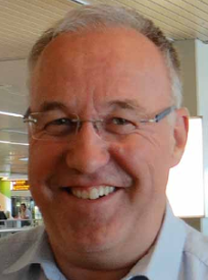Speakers

Risk management in the oil and gas industry: the BP Oil Spill
Prof. Arjan van Weele, TU/e
The oil and gas industry is characterized by strict saftey and environmental regulations. Oil companies and subcontractors yearly spend millions on audits, training and education. Risk management is key in this type of industry. At the 22nd of april 2010, fire ignited at the Deepwater Horizon oil drilling rig, resulting in the largest offshore oil spill in U.S. history. How could this happen? What can project and supply chain managers learn from this disaster? This presentation will analyse the BP Oil Spill and cover the import lessons learned. It will become clear that only risk management is not sufficient enough to prevent this kind of complex disasters in value chains.
Arjan van Weele holds the NEVIChair of Purchasing and Supply Management (0,5fte), at Eindhoven University of Technology, Faculty of Technology Management. Next, he serves as an independent boardroom consultant on procurement governance and strategy to many international companies.

Value Sourcing: Sharing ASML experiences in dealing with the extreme volatile Semicon Market
Hans Dijkhuis, ASML
The semiconductor industry demands extreme flexibility. While running an over 2.5 B Euro's supply chain with many single sourced high tech parts, in 2008 ASML's market went down by 85%. For being organized to deal with such volatility, the supply chain enabled ASML to achieve record sales in both 2010 and in 2011. ASML understood her limited ability to change the semicon market dynamics and sought risk mitigation by creating in close co-operation with her suppliers, the ability to cope with its impact.
Hans Dijkhuis is managing director and co-founder of Value Sourcing BV and Senior Manager Quality Process Improvement at ASML.
In 2001, after 12 years of working with DAF Trucks, initially as Development Manager Cab& Trim, and later as Purchasing Director, he joined ASML as Procurement Director. Next to several line responsibilities within Procurement, he modeled the ASML Value Sourcing Strategy and drove its implementation.
Value Sourcing BV helps companies to learn how to create relevant customer value by their supply chain.

Managing Supply Disruptions in Supply Chains
The focus on core competences, as well as the search for low labor costs, has led to vertical disintegration of multinational companies with exponential growth in transport as a consequence. Thereby, consumers depend on a large number of, often distant and hard to control, manufacturers and service providers. Such globally dispersed 'supply chains' are subject to many types of uncertainties; one being supply disruptions. Keeping more inventory is a widely used strategy for mitigating the effects of supply disruptions. In this talk, we will describe multiple models which 1) show the importance of protecting against these events and 2) provide ways of achieving more resilient supply chains.
Zumbul Atan is Assistant Professor, TU/e, OPAC Group. She received her Ph.D. in Industrial Engineering in 2010 from Department of Industrial and Systems Engineering at Lehigh University, PA, USA. She holds a B.Sc. in Industrial Engineering and M.Sc. in Industrial Engineering from Middle East Technical University (METU), 2002, and Bilkent University, 2004, respectively.Her current research interests include multi-echelon supply chains subject to demand and supply uncertainties (especially in form of supply disruptions), revenue management and queuing theory.

Managing shortage driven supply chains
Joost Rongen, EyeOn
Supply uncertainties and shortages are rapidly becoming common practice in supply chain management. Upper management urges for more integral visibility on the risks and dependencies in incoming supplies, as well as an adequate allocation management on products that are short in supply. In the past year, EyeOn facilitated a series of idealabs with various leading multinational companies (from High Tech, Food, Process and Life Science industry) to get a detailed insight how sourcing and supply chain planning processes are impacted. The main findings of these discussions will be shared in this session.
Joost Rongen is Sr. Business Consultant at EyeOn. He gained broad experience in operational supply chain management and process implementation & innovation at ASML and Philips in the areas of supply chain configuration, supply chain planning and customer & supplier collaboration. Currently works at EyeOn, with focus on the design, implementation and execution of excellent end-to-end integrated business planning processes via management consultancy, project & program management and operational interim management.

Entrepreneurship: gambling or calculated risks?
Hans van der Drift, Involvation
Companies realise that economic developments over the past decade have increased supply chain risks significantly, but only a limited percentage has implemented a structural risk management approach. This may be due to the focus on short term profits (conscious gambling) or lack of awareness and a systematic approach. In this interactive workshop, an integral approach to Supply Chain Risk Management will be presented.
Hans van der Drift is Consulting partner at Involvation. He has 15 year Unilever experience in various Supply Chain roles in different operating companies. Joined Involvation in 2008 as one of the consulting partners. Focus areas: Supply Chain strategy, S&OP, Demand and Supply Planning.

Balancing between opportunity and risks in the Lighting world
Jack van Lieshout, Philips Lightning Electronics
The Lighting business is undergoing a huge transformation. This comes with great business opportunities but at the same time significant risks in the supply chain, often with rather different nature, but all with potentially devastating impact to our performance. During the presentation you will learn how Philips Lighting is tackling supply chain risk management, using cases and explaining our supply chain strategy. Pro-activeness, Conscious decision taking and Pragmatism are key ingredients to a successful approach.
Jack van Lieshout is Senior director Global SCM, Philips Lighting Electronics.
He received his degree in Industrial Engineering from TU/e in 1993. Next he followed the 2 - year LMS trainee programme. Van Lieshout performed many positions for Philips Consumer Electronics and Lighting. Currently his position is senior director global SCM.

Darwin, survival of the fittest supply chain
Hugo van Daal, SC Professional 2013 finalist
Yes, you can go through the motions of risk management, launch the program and tick the boxes. But that will not necesarilly make you fit. Fit to survive a change in demand, supply and more serious catastrophies. Here the steps you need to make to become fit. And the good news is, you will make money in doing it !
Hugo van Daal worked for 11 years in the pharmaceutical industry for Merck, Sharp & Dohme as manager Global Logistics, Planning and Procurement. Next he worked at Abbott and as Groupe Director SCM at Bombardier. The last 2.5 years he worked as SCM director at Danone Nutricia. This year Hugo van Daal was SC Professional 2013 finalist.

Making the right risk decisions to strengthen operations performance
Piet van der Plas, PwC Advisory
Although more businesses have become aware of risks that their organization can harm (such as the tsunami in Japan or the recent floods in Germany), there are few who are able to implement adequate measures in the processes and organization in order to cope with these risks. This according to research by PwC and the Massachusetts Institute of Technology (MIT) related to the way multinationals deal with the risks to which they are exposed worldwide. The study analyses the supply chain operations and risk management approaches of global footprint organizations and looks at their operations in the face of supply chain disruptions.
Piet van der Plas is Senior manager, PwC Advisory, Amsterdam. Over 20 years of experience in project and program management in Supply Chain, IT and for Sales. I have acted in consultancy roles over 15 years and as program manager with operational responsibilities within Philips International. Experience in multinational, multilingual, multicultural transformations in the area of Supply Chain Management, IT, Sales.

Supply Chain Resilience Assessment at The Dow Chemical Company
Philippe Joffroy: Dow Chemical
Robust and reliable supply chains are an essential component of success for any global business, and this is particularly true in the chemical industry, subjected to a strict regulatory environment. With 2.5 million shipments per year, The Dow Chemical Company’s operations are sensitive to any geopolitical, macro-economic or natural disruption, and significant attention is paid to the question of supply chain resilience. The Supply Chain Resilience Assessment and Management (SCRAM) methodology was developed in partnership with Ohio State University, and assesses specific capabilities, perceived vulnerabilities and response levels to disruptive change. As such the methodology provides an excellent framework for gap analysis and mitigation planning, and has been widely deployed across the Dow envelope.
Philippe Joffroy is Associate Director, Supply Chain Expertise Center, Belfast. Philippe Joffroy current assignment involves the setting up, and development of Dow Chemical's new Supply Chain Technology Centre, with the mandate to deliver innovative, technology-driven, value-adding solutions across Dow's supply chains worldwide. Contingent on this strategic objective is the ambition to establish Dow as an employer of choice in Northern Ireland.
